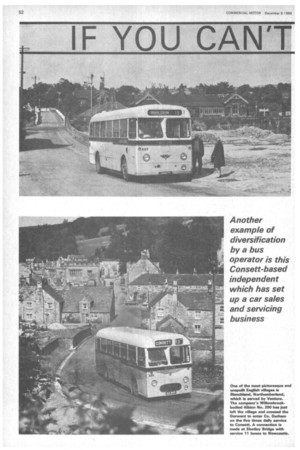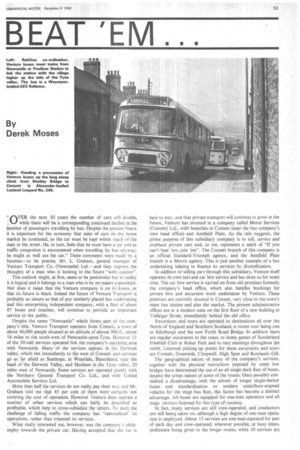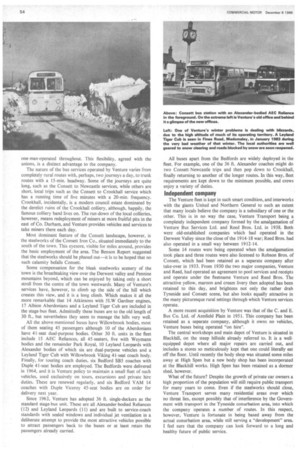IF YOU CAN'T BEAT 'EM
Page 54

Page 55

Page 56

If you've noticed an error in this article please click here to report it so we can fix it.
-rIVER the next 10 years the number of cars will double, 14.../ while there will be a corresponding continued decline in the :number of passengers travelling by bus. Despite the present freeze it is important for the economy that sales of cars On the home market be continued, so the car must be kept within reach of the man in the street. He, in turn, feels that he must have a car and as traffic congestion is encountered when travelling by bus anyway, he 'might as well use his car." These comments were made by a busman—to be precise, Mr. L. Graham, general manager of Venture Transport Co. (Newcastle) Ltd.—and they express the thoughts of a man who is looking to the future "with caution".
This outlook might, at first, seem to be pessimistic but in reality it is logical and it belongs to a man who is by no means a pessimist. Nor does it mean that the Venture company is on its knees, or that its future is black. Indeed the future of Venture Transport is probably as secure as that of any similarly-placed bus undertaking and this enterprising independent company, with a fleet of about 87 buses and coaches, will continue to provide an important service to the public.
Despite the name "Newcastle" which forms part of the company's title, Venture Transport operates from Consett, a town of about 40,000 people situated at an altitude of almost 900 ft.. about 14 miles to the south-west of Newcastle-upon-Tyne. However 11 of the 30-odd services operated link the company's operating area with Newcastle. Many of the services operate in the Derwent valley, which lies immediately to the west of Consett, and services go as far afield as Stanhope, in Weardale, Blanchland, near the head of the Derwent Valley, and Hexham in the Tyne valley, 20 miles west of Newcastle. Some services are operated jointly with the Northern General Transport Co. Ltd., and with United Automobile Services Ltd.
More than half the services do not really pay their way and Mr. Graham told • me that 45 per cent of them were certainly not covering the cost of operation. However Venture does operate a number of urban services which can fairly be described as profitable, which help to cross-subsidize the others. To meet the challenge of falling traffic the company has "rationalizedits operations, rather than trimmed its services.
What really interested me, however, was the company's philosophy towards the private car. Having accepted that the car is here to stay, and that private transport will continue to grow in the future, Venture has invested in a company called Motor Services . (Consett) Ltd., with branches in Consett (near the bus company's own head office) and Annfield Plain. As the title suggests, the prime purpose of this subsidiary company is to sell, service and overhaul private cars and, to me, represents a spirit of "If you Can't beat 'em, join 'em". The Consett branch of this company is an official Standard-Triumph agency, and the Annfield Plain branch is a Morris agency. This is just another example of a bus undertaking helping to finance its services by diversification.
In addition to selling cars through this subsidiary, Venture itself operates its own taxi and car hire service and has done so for some time. The car hire service is carried on from old premises formerly the company's head office, which also handles bookings for private hire and excursion work undertaken by Venture. These premises are centrally situated in Consett, very close to the town's main bus station and also the market. The present administrative offices are in a modern suite on the first floor of a new building in Trafalgar Street, immediately behind the old office.
Excursions and tours are operated to destinations all over the North of England and Southern Scotland, a recent tour being one to Edinburgh and the new Forth Road Bridge. In addition there are regular excursions to the coast, to home games of Sunderland Football Club at Raker Park and to race meetings throughout the north. Licensed picking-up points for these excursions and tours are Consett, Greenside, Chopwell, High Spen and Rowlands Gill.
The geographical nature of many of the company's services, together with the physical restrictions imposed by some low bridges have determined the use of an all-single-deck fleet of buses, despite the urban nature of some of the routes. Once possibly considered a disadvantage, with the advent of longer single-decker buses and standardization on modern underfloor-engined vehicles for the stage bus fleet, this factor has become a distinct advantage. All buses are equipped for one-man operation and all stage services licensed for this type of running.
In fact, many services are still crew-operated, and conductors are still being taken on, although a high degree of one-man operation is employed. About 15 services are one-man-operated for part of each day and crew-operated, wherever possible, at busy times, preference being given to the longer routes, while 10 services are one-man-operated throughout. This flexibility, agreed with the unions, is a distinct advantage to the company.
The nature of the bus services operated by Venture varies from completely rural routes with, perhaps, two journeys a day, to trunk routes with a 15-min. headway. Some of the journeys are quite long, such as the Consett to Newcastle services, while others are short, local trips such as the Consett to Crookhall service which has a running time of five minutes with a 20-min-: frequency. Crookhall, incidentally, is a modern council estate dominated by the derelict ruins of the Crookhall colliery, although, happily, the famous colliery band lives on. The run-down of the local collieries, however, means redeployment of miners at more fruitful pits in the east of Co. Durham, and Venture provides vehicles and services to take miners there each day.
Most dominant feature of the Consett landscape, however, is the steelworks of the Consett Iron Co., situated immediately to the south of the town. This eyesore, visible for miles around, provides the basic employment of the area. The Benson Report suggested that the steelworks should be phased out—it is to be hoped that no such calamity befalls Consett.
Some compensation for the bleak steelworks scenery of the town is the breathtakingview over the Derwent valley and Pennine mountains beyond, which can be enjoyed by taking only a short stroll from the centre of the town westwards. Many of Venture's services have, however, to climb up the side of the hill which creates this view, and it is a long climb. Which makes it all the more remarkable that 14 Atkinsons with 5LW Gardner engines, 17 Albion Aberdonians and a Leyland Tiger Cub are included in the stage-bus fleet. Admittedly these buses are to the old length of 30 ft., but nevertheless they seem to manage the hills very well.
All the above-mentioned buses have Willowbrook bodies, most of them seating 45 passengers although 10 of the Aberdonians have 41-seat dual-purpose bodies. Other 30 ft. units in the fleet include 15 AEC Re!lances, all 45-seaters, five with Weymann bodies and the remainder Park Royal, 10 Leyland Leopards with Alexander bodies of which six are dual-purpose vehicles and a Leyland Tiger Cub with Willowbrook Viking 41-seat coach body. Finally, for touring coach duties, six Bedford SB5 coaches with Duple 41-seat bodies are employed. The Bedfords were delivered in 1964, and it is Venture policy to maintain a small fleet of such vehicles, used exclusively on tours, excursions and private hire duties. These are renewed regularly, and six Bedford VAM 14 coaches with Duple Viceroy 45-seat bodies are on order for delivery next year.
Since 1963, Venture has adopted 36 ft. single-deckers as the standard stage-bus unit. These are all Alexander-bodied Reliances (12) and Leyland Leopards (11) and are built to service-coach standards with sealed windows and individual jet ventilation in a deliberate attempt to provide the most attractive vehicles possible to attract passengers back to the buses or at least retain the passengers already carried. All buses apart from the Bedfords are widely deployed in the fleet. For example, one of the 36 ft. Alexander coaches might do two Consett-Newcastle trips and then pop down to Crookhall, finally returning to another of the longer routes. In this way, fleet requirements are kept down to the minimum possible, and crews enjoy a variety of duties.
Independent company
The Venture fleet is kept in such smart condition, and interworks with the giants United and Northern General to such an extent that many locals believe the company is a subsidiary of one or the other. This is in no way the case, Venture Transport being a completely independent company formed by the amalgamation of Venture Bus Services Ltd. and Reed Bros. Ltd. in 1938. Both were old-established companies which had operated in the Derwent Valley since the close of the 1914-18 war; Reed Bros. had also operated in a small way between 1912-14.
Some 14 routes were being operated when the amalgamation took place and three routes were also licensed to Robson Bros. of Consett, which had been retained as a separate company after take-over in 1933. From 1930 the two major companies, Venture and Reed, had operated an agreement to pool services and receipts and operate under the fieetname Venture and Reed Bros. The attractive yellow, maroon and cream livery then adopted has been retained to this day, and brightens not only the rather drab Tyneside and Consett scene, but also looks equally attractive in the many picturesque rural settings through which Venture services operate.
A more recent acquisition by Venture was that of the C. and E. Bus Co. Ltd. of Annfield Plain in 1951. This company has been retained as a separate company, although it owns no vehicles, Venture buses being operated "on .hire".
The central workshops and main depot of Venture is situated in Blackhill, on the steep hillside already referred to. It is a wellequipped depot where all major repairs are carried out, and includes a stores so meticulously kept that one could literally eat off the floor. Until recently the body shop was situated some miles away at High Spen but a new body shop has been incorporated at the Blackhill works. High Spen has been retained as a dormer shed, however.
What of the future? Despite the growth of private car owners a high proportion of the population will still require public transport for many years to come. Even if the steelworks should close, Venture Transport serves many residential areas over which no threat lies, except possibly that of interference by the Government with transport in the Tyneside conurbation area, into which the company operates a number of routes. In this respect, however, Venture is fortunate in being based away from the actual conurbation area, while still serving a "development" area. I feel sure that the company can look forward to a long and healthy future of public service.












































































































